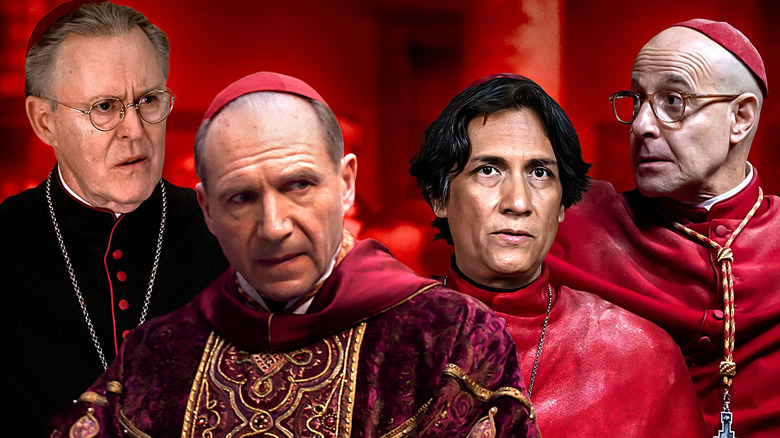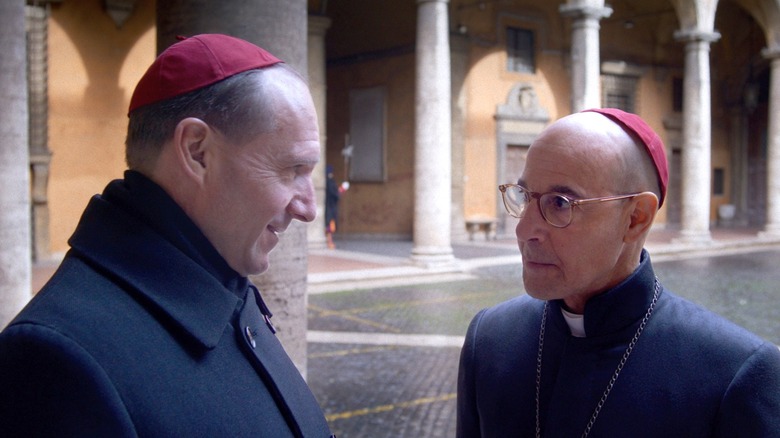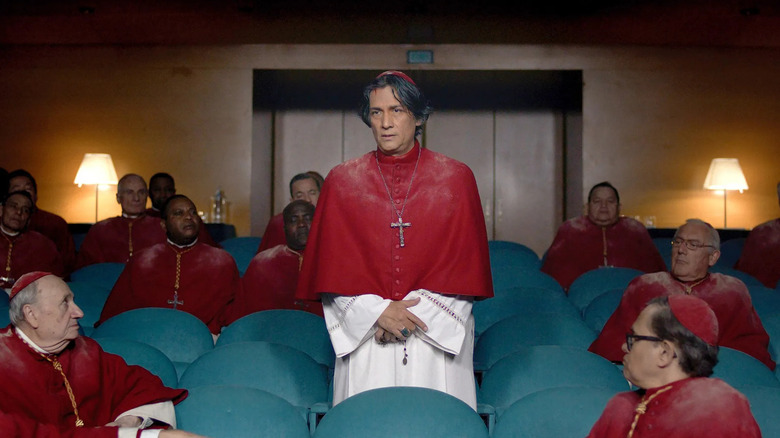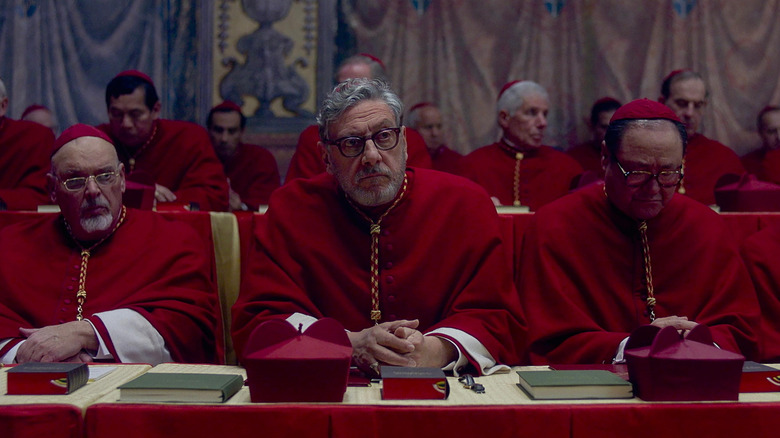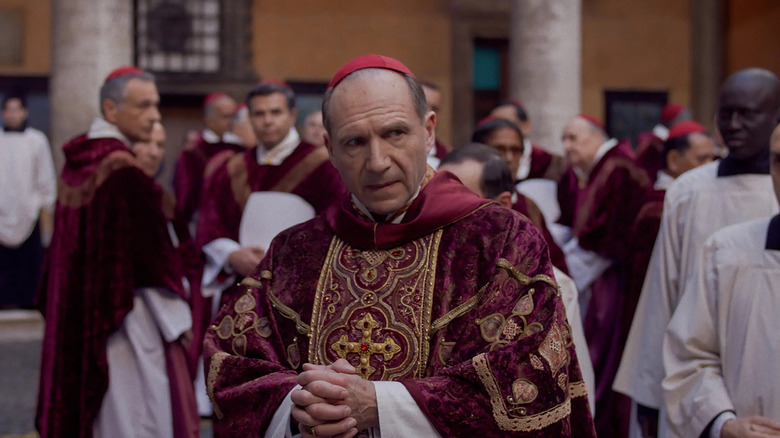Conclave Ending Explained: Who Is The New Pope?
Stop reading right now if you haven't seen "Conclave" — we'll be discussing the entire plot and ending here, so spoilers are coming!
When the Oscar nominations were announced in January, it wasn't particularly surprising to see Edward Berger's drama "Conclave" among 2025's Best Picture nominees. Based on the 2016 novel of the same name by Robert Harris with a screenplay penned by Peter Straughan ("Tinker Tailor Soldier Spy," "The Goldfinch"), "Conclave" focuses on a group of cardinals at the Vatican who must assemble in the titular conclave to elect a new pope after the previous one passes away, with a particular spotlight given to Cardinal Thomas Lawrence (Ralph Fiennes, who received his own Oscar nomination for his performance). Just as the conclave is about to begin, however, an unexpected cardinal — Vincent Benitez (Carlos Diehz), a Mexican-born cardinal who works as the Archbishop of Kabul in Afghanistan — joins the fray, shaking things up as the powerful men of faith fight over who gets to control the future of the Catholic church.
After days of vicious infighting, a handful of scandals, and a freaking explosion at the Vatican, the cardinals are in total disarray until Benitez steps up to give a speech to his fellow religious leaders — and the tide turns towards him. Here's everything you need to understand about what happens in "Conclave," that huge twist at the end of the film, and what the conclusion says (or tries to say) about the church as an institution.
What you need to remember about the plot of Conclave
As Cardinal Lawrence assembles the conclave in the wake of the pope's death, a few candidates seem to naturally arise. There's Lawrence's bestie, the American Cardinal Aldo Bellini (Stanley Tucci), who easily has the most progressive views of any candidate but still draws the line at fully including women in the church. (We'll circle back to this shortly, but women play a diminished role in "Conclave," save for Isabella Rossellini's Sister Agnes.) Meanwhile, Cardinal Joshua Adeyemi (Lucian Msamati), who hails from Nigeria, is very socially conservative; as Bellini irately tells Lawrence, Adeyemi has extraordinarily antiquated views regarding the LGBTQ+ community's place in the Catholic church. John Lithgow's Canadian Cardinal Joseph Tremblay, by comparison, is relatively moderate but was removed from his post before the late pope's death after he committed simony (meaning that he sold spiritual artifacts for cash). Then there's the Italian cardinal Goffredo Tedesco (Sergio Castellitto), a staunch traditionalist who wants the church to go back to its Roman principles and loves dramatically vaping during stressful moments.
Lawrence, who is messy and lives for drama, spends most of the seclusion trying to find secrets about the candidates at hand — even breaking into the late pope's chambers to steal the documents concerning Tremblay's simony — and he's also the one who spreads the word about Adeyemi's indiscretions (getting Sister Agnes involved, who helps him spill secrets during a meal). Throughout it all, Bellini's support quietly slips away, driving a wedge between the two friends, and Benitez is determined to vote for Lawrence, who insists he doesn't want the papacy.
Votes remain inconclusive for days, though Tremblay and Adeyemi's candidacies are wrecked by the simony reveal and the fact that Adeyemi had an affair with a nun years beforehand. Then, on the third day and sixth ballot, a bomber attacks the Vatican and brings the proceedings to a screeching halt. Tedesco, in turn, uses this opportunity to deliver a deeply racist rant about the faith of Islam, at which point Benitez interrupts.
What happened at the end of Conclave?
After Tedesco's utterly offensive tirade, Benitez restores order to the proceedings and delivers a genuinely stunning speech about his time in Afghanistan, proclaiming that hate and violence are not the answer to the Catholic church's problems. In what ends up being the final vote, Benitez is pretty overwhelmingly chosen as the next pope, and when he accepts the nomination, he declares that he will select the papal name "Innocent."
Throughout "Conclave," however, Lawrence's right-hand man and researcher Monsignor Raymond O'Malley (Brían F. O'Byrne) has been trying to get concrete information about Benitez's past. Indeed, up until the end of the film, the main thing that Lawrence and O'Malley know about the unexpected cardinal is that the former pope paid for a plane ticket for Benitez to fly to Geneva, Switzerland for a medical procedure that was ultimately canceled. It's only after Benitez is chosen as Pope Innocent that O'Malley tells Lawrence he's discovered what the procedure was in the first place.
Lawrence immediately requests an audience with Benitez and asks him about the procedure, at which point he learns that Benitez is intersex, meaning that he was born with male sex organs as well as a uterus and ovaries ... and the procedure was a laparoscopic hysterectomy. (Benitez didn't know he was intersex until he required a different surgery as an adult, and thus didn't know when he entered into the church.) Benitez then reveals he chose not to get the hysterectomy because, as he puts it, "I am what God made me." Lawrence leaves Benitez's chambers, watching as young nuns move throughout the Vatican's courtyard through his window as he accepts that the new pope could change the Catholic church forever.
What the end of Conclave means
Perhaps the most important line in all of "Conclave" comes during that climactic scene between Benitez and Lawrence when the former says to the latter, "I know what it is to exist between the world's certainties." Amidst all of the other cardinals, who are nothing if not strident in their views of how the church should evolve, Benitez is the rare cardinal who calls for peaceful approaches and more equality within the church. Notably, Benitez is also the only candidate who ever mentions women as a concept without a negative bent. In his speech after the explosion, he states, "The thing you're fighting is here — inside each and every one of us, if you give into hate now, if we speak of 'sides' instead of speaking for every man and woman."
The significance of Benitez being intersex and the next leader of the Catholic church cannot be downplayed; his body, as God made it, represents a whole faction of the world's population that Catholicism frequently tries to police (particularly when it comes to their opposition to women's reproductive freedom). There's also no question that Benitez is the right person for the job in that he's empathetic, inclusive, and thoughtful, creating a stark contrast to the reactionary cardinals like Tedesco and Adeyemi. Benitez's identity also does tie to Sister Agnes' role in the narrative, in a way; the good sister may be stuck on the sidelines for most of the movie (as is Benitez, whose support starts and grows slowly), but she's the one who exposes Adeyemi and Tremblay's wrongdoings, knocking two potential popes out of the running. Ultimately, Benitez's identity as an intersex person — and most notably, an intersex person who is proud and secure in their identity and who chooses not to get surgery that many would wrongly view as "corrective" — flies directly in the face of the Catholic patriarchy, creating a stunning ending for the story.
What has the cast and crew of Conclave said about the ending?
So, what has the creative team behind "Conclave" had to say about that ending? In October 2024, director Edward Berger (who also helmed the acclaimed 2022 film adaptation of "All Quiet on the Western Front") spoke to Vanity Fair about the movie's "big twist" and explained why he thinks the ending is so impactful and can lead to larger discussions — and why he didn't end the film immediately after Benitez's reveal.
The movie ends with Lawrence looking out of his window and watching the revelry over the new pope, including a group of young female nuns (who seem to also represent the church's potential future), not with Benitez's scene. As Berger put it, after the claustrophobic feel of the rest of the film, Lawrence opening his window represents a path forward for the church. To quote the filmmaker directly:
"Suddenly the shutters open. Light comes back in. Then [Lawrence] hears laughter. He realizes, oh, the right person has been selected to be pope. There's a smile on his face: this is the right thing for the future of the church. His boss accepted it, so why question it? Everything that [Benitez] says makes complete rational sense. This is part of his physicality. We elected him. Why would that change anything?"
So, does Berger think that, within the universe of "Conclave," there would be outcry if Benitez revealed his identity as an intersex person? "It doesn't matter," Berger clarified. "To me it really wouldn't change anything. Still the same pope, and all that matters is how he represents his community and brings other people together. To be honest, probably a lot of the cardinals would be upset or say he cheated, but I don't care. That's their problem, not Benitez's problem."
Finally, Berger expressed the belief that "not everyone needs to agree with the movie," realizing that the final reveal could be viewed as controversial. "This is what Benitez is about — bringing people together, furthering discussion, and not squashing it," he continued. "So if people disagree with it — which, to be honest, there will be people of course. But I'm not bracing myself, because I do feel that we try to deal with [the reveal] with diligence, sensitivity, and not using it as a plot device or anything. It's also not a takedown of the church. It really looks at the people of that faith with honesty — trying to understand and serve everyone's story."
"Conclave" is available to stream on Peacock now.
